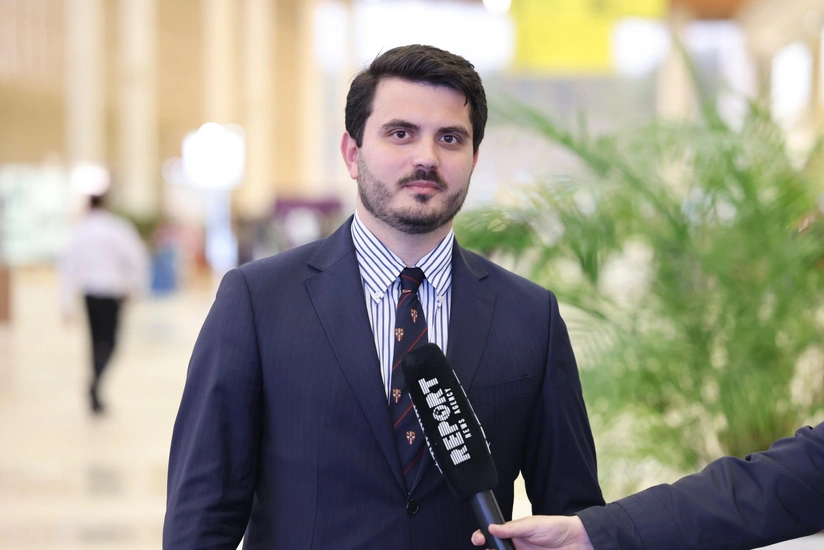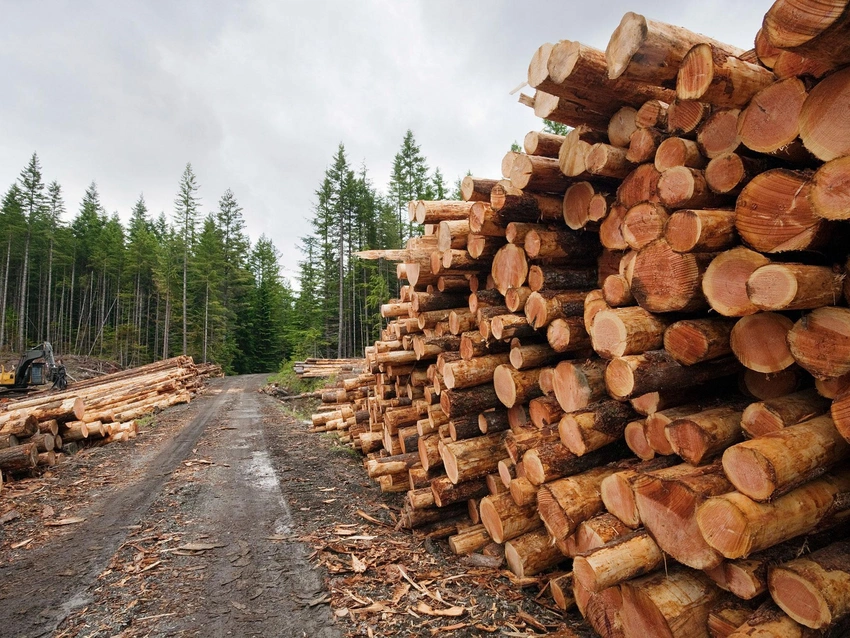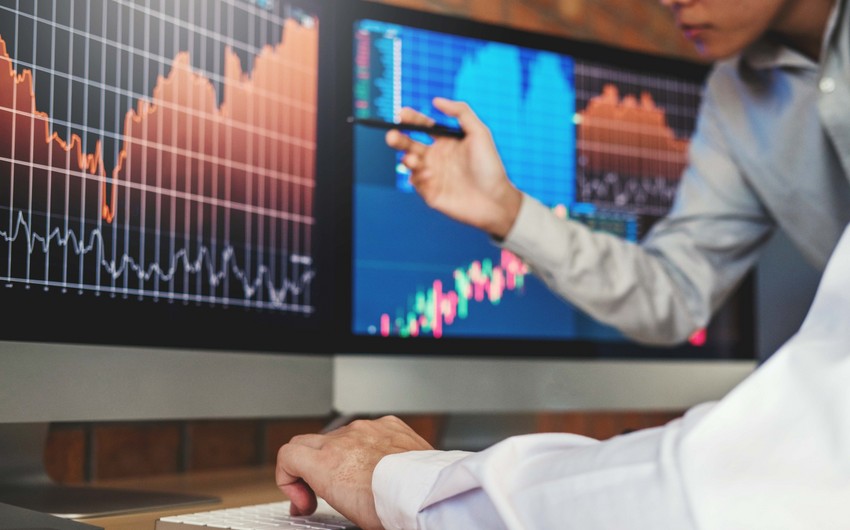Yaroslav Kovalchuk: Azerbaijani companies to be able to directly participate in trading on Belarusian exchange - INTERVIEW
- 20 October, 2025
- 15:50

Azerbaijan and Belarus maintain a stable economic dynamic, strengthening cooperation in many areas – from industry and agriculture to trade and investment. The Belarusian Universal Commodity Exchange (BUCE), which already handles a significant portion of mutual trade, has become an effective platform for expanding bilateral economic ties.
In recent years, Azerbaijan has confidently become one of Belarus's leading trading partners, and business interest in new forms of cooperation on both sides continues to grow. More Azerbaijani companies are joining trading on the Belarusian exchange, while Belarusian enterprises are actively exploring the Azerbaijani market, offering wood processing and agricultural products.
In an interview with Report, Yaroslav Kovalchuk, head of the Foreign Economic Activity Department at BUCE, discussed the dynamics of exchange trading between the two countries, the prospects for Azerbaijani producers to directly list on the exchange, and new opportunities for expanding mutual trade.
Report presents the interview:
- How many Azerbaijani companies are currently registered on the Belarusian Universal Commodity Exchange, and what are the exchange trading volumes between the two countries?
- Presently, 176 Azerbaijani economic entities are accredited on our exchange, with 38 of them joining this year alone. Most Azerbaijani companies actively participate in trading and are the main buyers of Belarusian sawn timber products.
Currently, Azerbaijan is among the top five countries by exchange activity. Russia ranks first, followed by China, Uzbekistan, Azerbaijan, and Poland.
In terms of volume, trade turnover with Azerbaijan through the exchange for 2024-2025 amounted to $175 million, and currently consists solely of Belarusian exports. The largest share is accounted for by sawn timber exports ($171.9 million), with the remainder coming from Belarusian milk powder, butter, meat by-products, and white crystal sugar.

I would like to note that there is a positive trend in Belarusian agricultural producers entering the Azerbaijani market through BUCE mechanisms. While agricultural products accounted for approximately 1% of exchange exports in 2024, this figure now exceeds 3%. This indicates not only an increase in share but also an increase in actual supply volumes.
Overall, according to this year's statistics, exchange transactions account for approximately 22% of all trade turnover between Belarus and Azerbaijan.
- Are products from Azerbaijani companies sold directly on the Belarusian Universal Commodity Exchange or through intermediaries from other countries?
- As I have already noted, the bulk of exchange trade between our countries currently consists of Belarusian exports. One reason for this is the lack of awareness among Azerbaijani producers about the opportunities available through BUCE and the mechanisms we offer to facilitate trade.
Currently, products from Azerbaijani companies are unfortunately traded on the exchange through intermediaries, both Belarusian and foreign ones. These products include cotton fabrics, raw calico, aluminum tape, and bentonite powder. In 2024-2025, the volume of Azerbaijani products sold through intermediaries amounted to approximately $1.4 million.
We have already sent information about these transactions to the Azerbaijan Export and Investment Promotion Agency (AZPROMO) and the Small and Medium Enterprises Development Agency (KOBIA). Furthermore, similar data will be shared with the producers themselves so they can assess the scale of their sales and, possibly, decide to list directly on the exchange. We sincerely hope this will encourage them to participate in the auctions.

I want to emphasize that our exchange is a state organization, and its activities are aimed not so much at commercial gain as at fulfilling state tasks, in particular at saturating the domestic market with demanded goods. Azerbaijan, as we know, is an oil and gas country, and petroleum products are of interest to the Belarusian market.
We see significant potential in Azerbaijani suppliers directly offering such goods at our trades. The wider the range of Azerbaijani products presented, the more beneficial it will be for both sides. For our part, we are ready to make the participation of Azerbaijani companies as convenient as possible - to accompany each client at all stages, help with accreditation, training, lot registration and participation in trading.
At the same time, all stages of participation in exchange trading are free: accreditation, participation training, use of software, participation in trading itself, as well as the use of exchange subaccounts in mutual settlements. The exchange fee is charged only when a transaction is concluded on the exchange platform and averages only 0.2%. However, in some cases, the exchange fee rate is even lower. For example, Azerbaijani buyers of Belarusian dairy products through the Exchange pay only 0.5 manats ($0.3), regardless of the amount of the exchange transaction.
- Has the potential for cooperation between Belarus and Azerbaijan in the exchange sector been fully realized? How much of a priority is the diversification of the product range for you today and in the future?
- We are certainly satisfied with the dynamics of using the mechanisms of the BUCE in mutual trade between Azerbaijan and Belarus. We see steady interest from Azerbaijani businesses and partner organizations in our platform and cooperation opportunities.
As part of our participation in the 30th anniversary Baku Build-2025 exhibition in Baku, we held productive meetings with representatives of AZPROMO, KOBIA, and several private companies. This interest is extremely important and inspiring for us.
At the same time, the potential for further growth is still great, and we hope that our participation in such events will help realize it in full. Our task today is not only to increase the volume of supplies of Belarusian sawn timber products to the Azerbaijani market, but also to diversify the export range. Moreover, we plan to expand the presence of products from the Belarusian Metallurgical Plant on the Azerbaijani market - these include rebar, wire rod, circles, and wire. Already in two days of the exhibition, we have seen that Azerbaijani entrepreneurs show significant interest in this category of goods.

I would like to specifically note the prospects in the supply of Belarusian meat products. Belarus is a multinational country where all religious and cultural traditions are respected. In this regard, many of our enterprises have an international Halal certificate, which opens up wide opportunities for export. We already supply halal meat products to the Azerbaijan market and are ready to significantly increase the volume of such supplies.
- In May of this year, as part of the Azerbaijan-Belarusian business forum, the first BUCE broker in Azerbaijan - LLC SAMA-ZT - was presented with an accreditation certificate. What role do exchange brokers play in increasing trading volumes between the two countries?
- Yes, indeed, the emergence of the first accredited exchange broker in Azerbaijan was an important event. We are sincerely happy about this, because brokers are professional participants in the exchange market who help Azerbaijani companies enter the Belarusian trading platform more easily and efficiently. Moreover, I can reveal a small secret: just the other day, the internal stage of accreditation for the second Azerbaijani broker was completed, and this week it will officially begin operations.
Thus, Azerbaijan will have two accredited brokers of the BUCE. We pay special attention to interaction with brokers, since they are our local partners and guides in foreign markets. To date, we have a fairly extensive network of brokers, and we intend to actively expand it.
Given the growing volume of exchange trade turnover and the high interest of Azerbaijani business in our instruments, we can confidently say: the number of Azerbaijani brokers will increase, and with it the total volume of trade between our countries.
